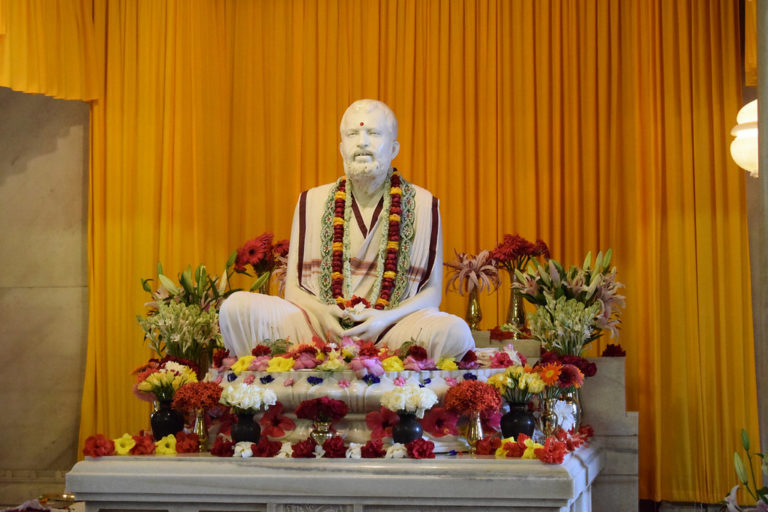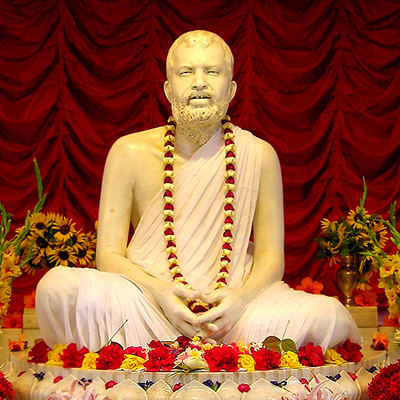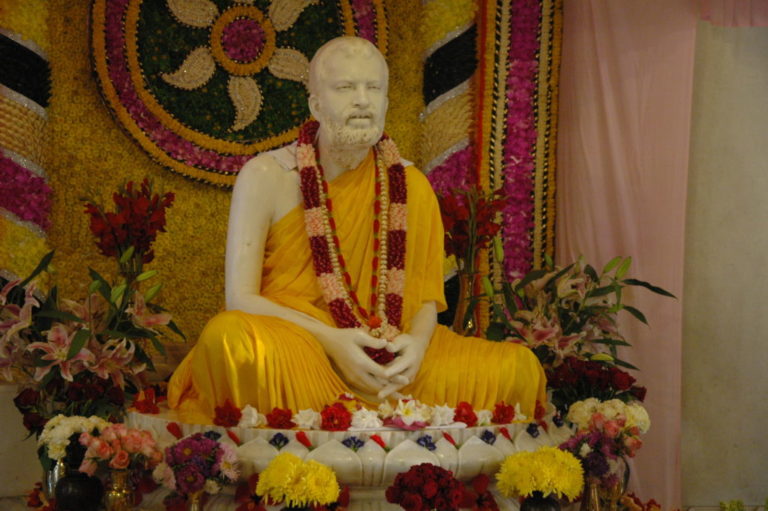1. The power and progress of man in modern times
Even the simplest person can see how far, with the help of education, wealth and self-effort, mankind is progressing at present in every field. It seems as if man refuses to set a limit to his advance in any department of life. Not satisfied with travelling on land and water, he has invented a new machine to fly in the sky; he has satisfied his curiosity by going down to the bottom of the sea and by exploring seething volcanoes; he has scaled mountains covered with perpetual snow, crossed the seas and observed accurately the mysteries of the various regions of the world; he has discovered a life, common with his own, pulsating in creepers, plants and trees. He extends his knowledge by subjecting all beings to his observation and experimentation. Achieving control over the five elements — earth, water, fire, air and ether—he has become acquainted with innumerable facts relating to this earth of ours. Still unsatisfied, he is eager to discover the secrets of distant stars and planets and is already successful to some extent in his quest. There is also no lack of effort on his part to investigate the laws of the inner life; by experiment and research he continually discovers new truths in that domain. He has reached the conclusion that one species of beings evolves into another and that the mind consists merely of subtle matter, and therefore has a beginning and an end. He is now assured that as in the external, so also in the internal world, every event is regulated by an inviolable law; and he is now familiar with the subtle laws governing irrational mental impulses, like the urge to commit suicide. Again although he has no positive evidence regarding the survival of the individual, the study of history has convinced him that the national life not only continues but also evolves. Thus, finding the fulfilment of the individual life in that of the nation, he wages perpetual war against ignorance with the aid of science and co-operative undertakings in order to achieve success in this regard. Imagining that, given unending struggle, he can discover the most hidden regions of the external and internal worlds and can achieve eternal progress, he has launched the boat of his life on a current of endless desires.
2. The centre of this power and progress in the west: it spreads to the East
Although this expansion of life originated chiefly in the West, a good deal of its influence is noticeable in India and other Eastern countries. As science daily brings East and West closer to each other, the Eastern outlook on life is gradually undergoing a change and conforming more and more to the Western pattern. This becomes clear from a study of the history of Persia, China, Japan, India and other Oriental countries. For better or for worse, Western thought has had, beyond any doubt, an influence on the East. It appears that the whole world will, in course of time, be pervaded by Western ideas.
3. The consequences of this progress are to be ascertained in the light of the western way of life
For an answer to the question whether this expansion of life has brought about good or bad results, we must go particularly to the West, where we shall also discover its source and nature. Such an investigation will show us how far the early ideas of the West have progressed or deteriorated, and whether there has been a loss or gain in man’s happiness. When this has once been ascertained regarding the individual and the nation in the West, the same process can, without difficulty, be extended to other countries, provided the time factor and the prevailing conditions are taken into account.
4. The cause and course of this progress in the West
History has recorded, in very clear terms, that from ancient times the severe cold in the dominant Western countries made men intensely body-conscious. This made them selfish. At the same time they realized that their selfish interests were best served by united effort, which in turn made them patriotic. This self-interest and patriotism led them, in course of time, to conquer other nations with great daring and rob them of their wealth. The struggle for existence then became easier, and gradually men acquired the capacity to look into themselves, which made them seek learning and the nobler qualities. They felt more and more drawn towards these higher pursuits beyond the mere struggle for existence. But now they encountered obstacles. Religious belief and a bigoted priesthood stood in the way of further progress. The priests did not merely utter threats condemning men to hell if they acquired such learning; they went further, and actually employed fraud, force and stratagem to prevent them from proceeding along that path. But the Westerners, being accustomed to pursuing their own self-interest, did not take long to find out how to overcome the priests’ opposition. They pressed forward, forcibly removing the priests from their path. Rejecting the scriptures and denouncing religion as well as the priests, they began to guide their life along a new channel, and made it a principle not to believe or accept anything that could not be perceived by the senses.
Holding that truth can be ascertained only by the direct evidence of the senses backed by reasoning, inference, etc., the West henceforward began to worship objective matter. Thinking that the subject, perceived as the “I-consciousness”, belonged likewise to the category of matter, it therefore proceeded to investigate the nature of that consciousness also by the method of perception, of which we have already spoken. Thus, for the last four hundred years, men in the West have accepted only those things in the universe which could be investigated through the five senses. Within that period physical science outgrew the mistakes and limitations of its infancy and entered upon its youth characterized by energy, optimism, enthusiasm and love of power.
5. Ignorance of the knowledge of the Atman: the resulting dissatisfaction
Although capable of achieving great progress in physical science, the procedure just mentioned could not lead men to the knowledge of the Atman. For, the only way to attain that knowledge is through self-control, selflessness and introspection, and the only instrument for attaining it is the mind with all its functions brought under absolute control. It is therefore not surprising that, being attracted only by external objects, they missed the path to Self-knowledge and identifying themselves with the body became materialists. That is why they regard worldly enjoyment all-important and make a special effort to obtain it. Their knowledge of material things, acquired through science, has been applied chiefly to that end and has made them more and more selfish and conceited. Therefore we find in the West a social system based on wealth. We also find there death-dealing weapons, deep-rooted discontent due to poverty side by side with abounding prosperity, and unquenchable thirst for wealth, the occupation and oppression of other countries, and so on. Because of all this, the hankering of the soul is not satisfied; even the belief in the survival of the nation after the death of the individual brings no happiness. After careful thought, certain people in the West have at last come to realize that the knowledge obtained through the senses will not enable them to discover the reality beyond time and space. Science gives them a fleeting indication of its existence, but nothing more; for that reality is beyond its reach and understanding. A feeling of utter helplessness has come over men and there is a growing lament in their hearts, because of the overthrow of that God on whom they depended for all their strength and power, and through whose grace they enjoyed splendour and prosperity.
6. If the East wants to ‘progress’ like the West, it has to cultivate selfishness and a passion for sense-pleasures
Thus a study of history shows that Western civilization is founded on self-love, desire for worldly possessions and absence of faith in religion. Should therefore an individual or a nation wish to achieve the results obtained by the West, he or it must build on that foundation. That is the reason why Japan and other Oriental countries which have modelled their national life entirely after the West cannot, with all their love of country and nation, escape these evils. This is the unfortunate result of being inspired by Western ideals, as will become clear by a study of Indian life after it came in contact with the West.
7. Foundation of the ancient national life of India
The first question that may be asked is whether India ever had any national life before it came in contact with the West. The answer is that, although it was not there in name, it undoubtedly existed in fact. For even in those days the people of India as a whole venerated the Guru, the Ganga, the Gayatri and the Gita; and “Go” (the cow) was worshipped everywhere. Ideas from the Ramayana, the Mahabharata and other religious books inspired and guided the life of every man, woman and child; and Sanskrit, the “language of the gods”, was the common medium of expression for the learned. There were many other similar factors of unity, and there is no doubt that religious ideas and religious practice constituted the bed-rock of that unity.
8. Founded on religion, the society of India never ran after worldly enjoyments
Religion, the basis of the national life in India, made her civilization unique. The chief characteristic of this civilization was self-control, which regulated both individual and national conduct. “Through pleasure, beyond pleasure” was the maxim of every Hindu in his journey through this life, which was looked upon as only a preparation for the life to come. Reminded of this high ideal at every stage of the individual or national life, a Hindu could not lose sight of it. He was forced, so to say, to keep himself always oriented towards this grand goal. It is for this reason that the caste or class system did not for a long time create any conflict of interests, and prevented the growth of discontent in society; for when anyone could achieve supreme knowledge or liberation by the unselfish performance of his own caste or class duties, irrespective of his birth, high or low, what could possibly be his cause for discontent? Contrary to what happened in Western society which is based on the right to equal opportunities for enjoyment, there was no dissatisfaction among social groups in ancient Indian society, based as it was on the equal right and opportunity to achieve the highest ideal, namely, supreme knowledge or liberation. The changes that have occurred in the national life of India since, and as a result of, its contact with the West are discussed below.
9. The occupation of India by the West and its result
It was natural and inevitable that the occupation by the West should bring about many changes in the distribution of the national wealth in India. But the influence of the West went farther. It produced a radical change in the deep-rooted convictions which had guided men and women from times immemorial. As a result, the impression grew that the doctrine, “Enjoy to renounce”— i.e., the aim of enjoyment is ultimately to renounce everything—was an empty tale invented by self-seeking priests; that the idea of survival after death was but a poet’s fancy; and that no rule could be more unjust and unreasonable than that a man should be condemned to remain all his life in the stratum of society where he was born. Coming more and more under the spell of the West, India rejected the ideal of renunciation and self-control and began to run after worldly pleasures. This attitude brought with it the decay of the ancient system of education and training, and there arose atheism, love of imitation, and lack of self-confidence. Thus the nation lost its backbone. People came to believe that their long-cherished beliefs and practices were erroneous, and they felt that perhaps their traditions were crude and semi-civilized, as the West with its wonderful knowledge of science declared them to be. Blinded by the desire for enjoyment, India forgot her ancient culture and glory. The loss of that memory confused her understanding, and the national existence itself was at stake. Finding that, even for worldly enjoyment, she had to depend on others, India was overcome with a sense of frustration. Having thus lost the way both to enjoyment and to liberation, and yet being bent on imitating others, the nation was now buffeted by waves of desires, like a boat drifting without a helmsman.
10. The attempt to revitalize India in imitation of the West, and its results
There arose a clamour on all sides that there never had been a national life in India; that although, thanks to the West, there was at last some sign of it, there were still many obstacles to its full growth. Deep-rooted religious beliefs were said to have smothered it. Idolatry— the worship of innumerable gods and goddesses—was also blamed for keeping it submerged so long. “Away with idolatry!” people shouted. “Root it out, only then will the men and women of the country have new life instilled into them.” Christianity began to be preached, and, in imitation of it, the idea of monotheism. Prostrate India was made to listen to lectures—delivered at public meetings held in the Western manner—on politics, sociology, the freedom of women and widow-marriage. But the feeling of frustration and despair, instead of lessening, grew stronger. The railway, the telegraph and other products of Western civilization came into use; but these did not mend matters, because all such innovations could neither touch nor stimulate the ideals on which the life of the land depended. Since the proper remedy was not applied, the disease could not be cured. How could India, whose soul was religion, be brought to life if her religion was not resuscitated? The influence of the West had brought about its fall. Would it not be futile, then, to look to the atheistic West for its resurrection? Being itself imperfect, how could
the West make another part of the world perfect?
11. The national life of India: its merits and demerits
It cannot be said that there were no defects at all in the national life of India before the coming of the Westerners. But the nation being vigorous, there was a constant endeavour on its part to remove any defects. Now that the nation and society were lacking in this effort, the spread of Western ideas and ideals, instead of curing the disease, was on the point of killing the patient.
12. The present decline of religion is the result of the spread of Western thought
It is thus clear that the decline of religion in the West has affected India also. One is surprised to find how far this decay of religion has spread all over the world at the present time. If there is really such a thing as religion, and if men have the power to realize it, through the grace of God, there is no doubt whatsoever that the modern age, steeped in sensuous pleasures, has strayed far away from it. That is the reason why science, although enlarging the scope of modern life by providing men with all kinds of means to enjoyment, has failed to bring them peace. Who will come to the rescue? Whose heart will be so moved by this restlessness and agony of the world as to make him ignore all sense-pleasures and discover a new mode of religion suited to the age? Who will reverse the downward course of religion in East and West, and once again teach men to follow the path to peace?
The divine Lord has promised in the Gita that, through His Maya, He will assume a human body and manifest His powers whenever religion declines, and will help men to obtain peace. Will not the need of the age rouse His compassion? Will not man’s helplessness and despair urge God to assume a body?
13. God incarnates once again to stop the decline of religion
The demand of the times has, O reader, actually brought this about; for the divine Lord has, in truth, once again been born as the spiritual Teacher of the world. Listen with faith to His gracious message: As many faiths, so many paths and you will realize the divine Lord through any spiritual practice performed with a sincere heart. Let us dwell in admiration on the unheard-of renunciation and austerities practised by Him in order to bring back that transcendent knowledge to the world. Come, let us discuss and meditate on that holy life, free from the slightest taint of lust, and thus purify ourselves.


